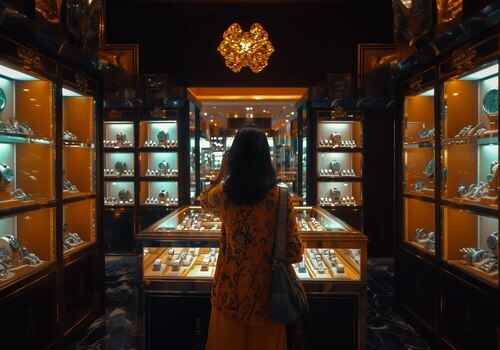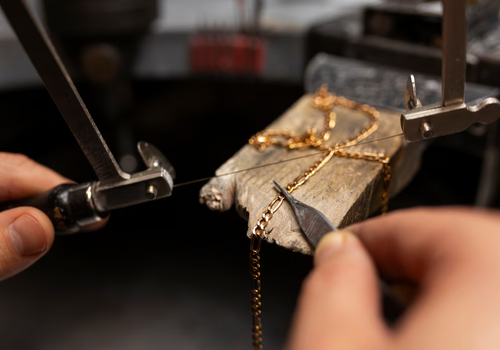Jewellery | Luxury Goods
Interest in Jewellery
Humans have been wearing jewelry for thousands of years. Although the exact reason behind our ancestors’ invention of jewelry is unknown, the curiosity endures to this day. Wearing jewelry is commonplace practically everywhere, across cultures and traditions. The majority of jewelry sales are for decorative products. Some believe that a person’s riches, honor, significance, and social standing are all reflected in their jewelry. In a lot of cultures and religions,
For their therapeutic properties, individuals wear jewelry made of precious metals and stones. Because gold and other precious metals are highly prized and only increase in value over time, jewelry is also utilized as an indirect investment. Additionally, jewelry items are passed down from one generation to the next, modified to reflect current fashion and ornamental trends. This makes it a depiction of ancestry as well. Until you approach a customer directly, it is hard to single out one explanation for our infatuation with jewelry. If you work in the jewelry industry, you need to understand the type of morale and motivation that drive consumer behavior. These factors can differ depending on the location and can be rather minor.
For instance, China, India, the United States, the United Arab Emirates, and Iran are the largest gold-consuming nations. However, the values and justifications for purchasing in each of these nations differ significantly from one another.

Jewelry Niche: What Is It?
Most jewelry is worn as bracelets, bangles, anklets, necklaces, finger rings, earrings, and nose rings. Gold, platinum, palladium, silver-sterling, titanium, tungsten, and stainless steel are the main metals used in jewelry. Additionally, diamonds, emeralds, rubies, sapphires, aquamarine, opals, tanzanite, rose quartz, and other precious stones are frequently found with jewelry. There are many different types of jewelry, and demand for each type varies as well. Jewelry manufacturers have relied on these different jewelry styles and varieties to build their USP and niche.
Several well-liked jewelry styles include:
- Vintage Jewelry
- Jewelry for Temples: Beaded Jewelry
- Fashion jewelry (imitation jewelry) for a wedding
- Exquisite jewelry made of gold or silver jewelry that lasts
- Vintage Jewelry
- Jewelry for
- Temples: Beaded Jewelry
- Fashion jewelry (imitation jewelry) for a wedding
- Exquisite jewelry made of gold or silver
- Jewelry that lasts
Opportunities for a Jewelry Company

Opportunities for a Jewelry Company
Why Launch a Jewelry Company | Grow a Jewelry Company
It is frequently profitable to launch a jewelry business or jewelry line because of the great demand for jewelry products in all shapes and sizes in every potential market area. Almost everyone, regardless of financial level, occasionally purchases jewelry for themselves or as gifts for others, whether in small or large quantities, for regular usage, or for special occasions. Here, we’re talking about the fact that buying happens for sure, not the motivations or reasons behind it. Jewelry is available in a wide range of styles and pricing points, just like any other product.
For exceptional occasions like marriages or baby shower ceremonies, beautiful metals like gold, diamond, or silver are selected. Fashion jewelry is used for everyday or informal occasions. As a result, there is a steady market need for jewelry products. While most buyers of fine jewelry plan their purchases, those who acquire items at the lower end of the price range do it on impulse. Therefore, there are a variety of verticals where the cost to start a jewelry business varies depending on the model, such as starting counterfeit jewelry, diamond jewelry brands, or silver/gold jewelry businesses. It is crucial to first finalize your brand ethos based on your brand positioning and the niche you want to establish. Want to learn more about starting a jewelry brand?
From a business standpoint, the jewelry industry's challenges

1. Following the latest trends
The majority of jewelry purchases are made for decorative purposes. It is hence susceptible to fashion wear trends. The external component, or the jewelry’s design, is more significant even though the constituent parts, such as the metals and stones, must adhere to the established quality standards. As seasoned jewelry advisors in the retail industry, TRS is aware of how difficult it is to forecast these trends. Jewelry businesses frequently witness people leaving because they were unable to find exactly what they were looking for. Second,
Conceptualizing or incorporating a new design and bringing it to the marketplace requires skill, time, and adjustments to the casting process. Depending on the complexity of the desired design, some jewelry businesses provide customization, but only if buyers are prepared to wait a few days or weeks.

2. Acquisition of customers
When it comes to fine jewelry or any other occasion-based jewelry, the issue of acquiring new customers is more severe. Personal occasions largely dictate these purchases. In their purest and most genuine forms, precious metals like gold or diamond are not intended for everyday usage or casual gifting. For a person, such events are uncommon. As a result, purchases in a particular market with a small consumer base are typically one-time events. This issue is made worse by competition, which also impacts other jewelry-related firms. Product collection is another barrier to acquiring customers.
When it comes to fine jewelry or any other occasion-based jewelry, the issue of acquiring new customers is more severe. Personal occasions largely dictate these purchases. In their purest and most genuine forms, precious metals like gold or diamond are not intended for everyday usage or casual gifting. For a person, such events are uncommon. As a result, purchases in a particular market with a small consumer base are typically one-time events. This issue is made worse by competition, which also impacts other jewelry-related firms. Product collection is another barrier to acquiring customers.
3. Growing | Extending the Jewelry Industry
Entrepreneurs and businesspeople should constantly have their feet planted firmly in the present while looking to the future. For a business to survive over the long term, growth and development are essential. The same is true for jewelry companies. According to TRS, which provides retail consulting services for jewelry and luxury businesses, scaling presents a special set of difficulties. First, more money needs to be spent on inventories. This sum tends to be considerable because jewelry is made up of valuable metals and stones. Hiring or buying real estate are examples of additional investments that are necessary to launch a profitable jewelry business. Second,
Opening a new jewelry business requires more work. For jewelry business owners, the managerial load suddenly doubles. Managing the business operations of several jewelry stores is never easy. Thirdly, poor management exposes brand reputation and customer service. Aspects relating to services also suffer as operational control becomes more difficult. TRS retail business jewelry consultants, who have extensive experience developing and implementing SOPs, strongly advise implementing an operating structure based on SOPs.

4. Jewellery Jewelry Store Franchising
A clever and effective strategy for business growth and expansion is franchising. Numerous global brands have been able to penetrate foreign markets because to it. However, there are numerous instances of jewelry franchise failures on a national and worldwide scale. The repute of the franchisors’ brand is something that franchisees can take for granted. Not every franchise jewelry business was able to withstand the years of effort that franchisors invested in establishing a reputation for their brand. The consequences of such underestimations are frequently evident in the way franchisees conduct business, particularly in how seriously they take customer care and support tasks.
A clever and effective strategy for business growth and expansion is franchising. Numerous global brands have been able to penetrate foreign markets because to it. However, there are numerous instances of jewelry franchise failures on a national and worldwide scale. The repute of the franchisors’ brand is something that franchisees can take for granted. Not every franchise jewelry business was able to withstand the years of effort that franchisors invested in establishing a reputation for their brand. The consequences of such underestimations are frequently evident in the way franchisees conduct business, particularly in how seriously they take customer care and support tasks.
5. Jewellery Jewelry Store Franchising
Jewelry faces some obstacles in the internet channel, even with eCommerce’s overall growth. Seldom are pricey jewelry items purchased online. The absence of tangible confirmation is the cause. Most consumers feel uneasy about making large jewelry purchases from internet retailers. Customers prefer to buy exquisite jewelry in a jewelry store, regardless of how knowledgeable they are about precious metals, stones, or diamonds. When it comes to fashion or other reasonably priced jewelry, the issues are not as bad. However, as companies start to address customer concerns, it is possible that the eCommerce channel will become more widely accepted as a means of buying exquisite jewelry.

6. The Experience of Customers in the Luxury and Jewelry Industry
To improve the consumer experience, jewelry businesses must implement technology and e-commerce in pertinent ways. Wearing jewelry is a personal necessity. Consumer behavior is significantly influenced by personal preferences, experiences, and emotions. Due to their high degree of subjectivity, these factors are challenging to accurately read or forecast. Data analytics and digital marketing are quite helpful in enhancing the consumer experience. Conventional jewelry manufacturers cannot afford to ignore technology that improve their understanding and mapping of the client experience. Experience stores or remote AR-VR experiences, according to many modern luxury retail consultants, might have significant marketing value in attracting new customers and improving existing ones.

How the Jewelry Business Consultants at TRS may assist
Retail Advisors | Jewelry Advisors | High-End Retail Advisors

1. Jewelry Industry Market Analysis
The market overview, channels, competition, demand, pricing, trends, SWOT analysis of the jewelry company, and other factors are all analyzed in TRS market research study. A skilled group of jewelry business experts conducts a thorough analysis of all the important market factors. The objective is to conduct a comprehensive market analysis and extract precise and useful information for better planning and decision-making in order to run a more successful firm. We move from “how things are” to “what can be done” in pursuit of wisdom.

2. Development of Jewellery Business Models
By creating a powerful brand positioning with operations automation, TRS jewelry business consultants assist clients in launching or growing jewelry businesses. Finding the ideal UVP for our clients and developing the value chain’s and internal capabilities’ strategic framework are our main priorities. This framework outlines how the desired value will be produced and provided to clients. Value proposition, budgeting and cost analysis for starting a jewelry business, omnichannel strategies, business-IT requirements, and sales and operations strategies are all covered by our team of jewelry business consultants as part of business development services.

3. Jewellery Business Strategy Consulting
The jewelry industry, like other industries, requires the development of functional or commercial strategy. This guarantees the orderly and synchronized operation of every function as well as the entire business system. Sales and showroom operations, finance, human resources, IT, marketing, logistics, and other fundamental and supporting functions are included in these functional categories. Each of these subsystems needs to strive for the fulfillment of its functional goals and make a contribution to the achievement of the overarching business goals. In order to successfully implement the business model, our team of jewelry business consultants will identify, define, and map the roles of each department and their operational interrelationships.
4. Development of Jewellery Business Plans
Planning and the required financial predictions are essential for determining the viability and strength of launching a jewelry line. We help clients assess the commercial viability of their business initiatives while developing jewelry business plans. When preparing jewelry business strategies, our team of jewelry consulting specialists adheres to a rigorous, thorough, and methodical procedure. When creating a jewelry business plan, important topics include beginning and capital investments, operating expenses, jewelry business startup costs, jewelry website development costs, jewelry business profit margin analysis, revenue turnover, inventory and purchase planning, profit and loss forecasts, ROI and break-even analysis, jewelry shop profit margin analysis, etc. These financial evaluations can act as a guide for launching a jewelry business and for analyzing risks while making financial decisions.
5. Consulting for SOPs
Our goal in SOP consulting is to assist clients in transitioning from people-dependent business systems to process-oriented companies. We assist clients in establishing a strong basis for automation in jewelry business management and operations management. For the operations and procedures involved in the jewelry industry, we create Standard Operating Procedures (SOPs). Sales and operations teams receive frequent training sessions from our SOP training specialists for the jewelry industry. Our SOPs assist clients in automating daily operations, ensuring consistency in performance and output standards, improving growth systems, and preventing productivity loss. A skilled group of retail jewelry business advisors provide these services.

6. Jewellery Business CX Strategy
One of the most important aspects of the jewelry industry is customer experience. It has a big impact on how quickly people go through their purchasing experience. Customers are closer to making a purchase or achieving any conversion objective when they have a positive experience, which speeds up and simplifies this process. The goals and activities for CX must be thought through beforehand; they cannot be chosen on the spot. The CX factor needs to be addressed at every touchpoint, both digital and physical. Our jewelry consulting specialists help customers design and execute CX strategies for their businesses as well as map out the CX journey.

7. Jewellery business consulting and jewellery business franchising
Jewellery brands frequently choose to go the franchise way since it is a successful business expansion strategy. We assist clients in planning and executing their franchise initiatives in franchise consulting, keeping in mind the most recent procedures and difficulties unique to the jewelry industry. We help with brainstorming expansion plans, creating the jewelry franchise business plan, mapping out the search for franchise partners, creating the franchise legal agreements, creating the business process manuals, and establishing the audit procedures.
Jewelry consulting and luxury retail consulting are just two of the many verticals in which our boutique retail consulting organization has experience and knowledge. If you would like more information about our luxury retail consulting or jewelry business consulting services, please send us a message, and our team will arrange a callback with your firm. Do you intend to establish a jewelry store brand? Or are you trying to find business consultancy services for jewelry? Or searching for retail automation for jewelry? Speak with us right now!
FAQs
Are you looking for advice on how to launch a jewelry business?
Seven important things to think about when launching a new jewelry company
The first is the jewelry business model.
#2: Finalization of the Product Category
#3: Planning the Layout of Jewelry Stores (Online & Brick and Mortar)
#4: Structure of the Organization
#5: SOPs, or standard operating procedures
#6: Jewelry ERP Software Assessment and Choice
#7: Training for Jewelry Sales and Operations
How can a jewelry store be started?
5 essential steps to launch a jewelry business
First step: Business plan for jewelry
Step 2: Verification of Store Location
Step 3: Plan for Sales and Operations
Step 4: Planning the Layout of a Jewelry Store
Standard Operating Procedures/Jewellery Management System is the fifth step.
What is the startup cost for a jewelry business?
The following variables affect how much it costs to launch a jewelry business:
- Type of Business Model (Hybrid, Offline, or Online)
- Brand positioning, including high-end, luxury, and premium brands.
- Product mix and kind (fine jewelry, fashion jewelry, jewelry made of gold, silver, or diamonds, etc.).
- When it comes to jewelry stores, the store’s location and size as well as any potential business niche.
- You can work with TRS Jewelry business plan consultants to determine the finances and investment needed to launch a jewelry business if you know the answers to the aforementioned questions. The business plan might also help you raise money from banks or investors.
In search of business consulting for jewelry. How is TRS able to assist?
Since 2000 , TRS has provided consulting services for retail management. The following services are areas of specialization for TRS Jewellery Business Consultants:
- Jewelry Business Market Research.
- Development of Jewelry Business Models.
- Consulting for Jewelry Business Strategies
Consulting for Jewelry Business Plans. - Automation and Management of the Jewelry Industry.
- Consulting for Jewelry ERP & Jewelry Inventory Management Systems.
- Consulting for Jewelry Franchises.
- Jewelry Training Courses on Management and SOPs.
- Contact TRS Retail Experts right now to learn more!
How can I start a jewelry company?
Building a jewelry brand requires the following prerequisites:
- Describe the UVP and niche brands.
- Establish the positioning of your brand.
- Describe the systems, procedures, and SOPs. (Remember: a brand cannot have subpar systems.)
Establish your plan for sales and operations. - Establish your marketing strategy.
- The following exercises will aid in defining the five prerequisites mentioned above:
- By use of competitor analysis (see this video for a quick overview) Go here.
- Business Plan (budgeting your investments) Customer Analysis.
Contact TRS Retail Experts right now to learn more!
How to grow your jewelry company How to expand your jewelry company How can I make my jewelry retail business better? How can I differentiate my jewelry line?
Given the intense competition in the jewelry industry, it is critical for any brand to have a competitive advantage in order to preserve or grow its market share and sales. Growth has been slow for jewelry manufacturers who have not changed their business strategy, particularly since the COVID-19 pandemic.
A few important factors for the expansion of a jewelry firm are:
Brand Niche: Explaining to your customers why they should choose to purchase from you rather than your rivals is crucial.
Brand Experience: The foundation of a successful company is repeat business. A lack of trust in the brand will result from subpar systems, procedures, and services.
Jewelry brand franchising has produced positive results for a number of firms.
What dangers exist for a jewelry company?
Principal dangers to the jewelry industry:
Loss of Customer Trust: As a result of subpar systems and procedures and expensive making fees when purchasing or selling
Ineffective Inventory Control: Any brand must implement RFID technology and jewelry inventory management systems with clear standard operating procedures.
Unexpected Growth: Growing without the necessary systems in place could result in unforeseen losses and brand depreciation.
Ineffective Cash Management Having cash collection, deposit, and reconciliation mechanisms in place at stores is crucial to preventing unforeseen losses.
Inadequate Security Administration: In order to prevent theft and obtain insurance in the event of theft, jewelry retailers require sufficient security and surveillance equipment.
Speak with TRS professionals right now to learn how to counter these dangers!
How should my jewelry business be run?
Strategies for effectively running your jewelry company:
- Establish your standard operating procedures, or SOPs.
- Perform routine audits of your processes.
- Perform mystery shopping and sales audits on a frequent basis.
- Establish your HR policies.
- Put in place business ERP and the necessary automation software.
- Put in place procedures and systems for loss prevention.
- Establish your spending plans.
- Employ middle-level managers to oversee company operations.
Contact TRS retail business specialists right now for assistance in the aforementioned areas!





